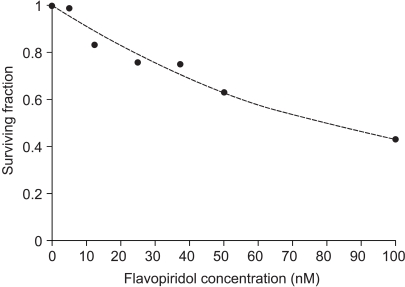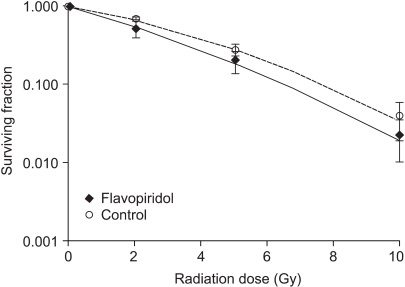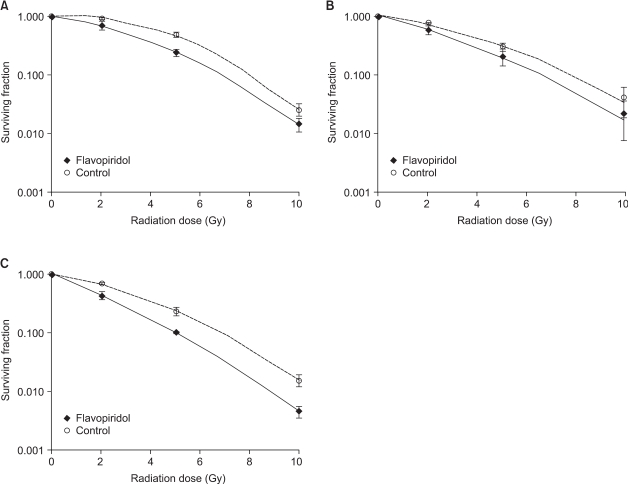Cancer Res Treat.
2005 Jun;37(3):191-195.
Enhancement of Radiation Effects by Flavopiridol in Uterine Cervix Cancer Cells
- Affiliations
-
- 1Department of Radiation Oncology, The Catholic University of Korea College of Medicine, Korea.
- 2Department of Radiation Oncology, Seoul National University College of Medicine, Korea. wuhg@snu.ac.kr
- 3Cancer Research Institute, Seoul National University College of Medicine, Korea.
- 4Institute of Radiation Medicine, Medical Research Center, Seoul National University, Korea.
- 5Department of Radiation Oncology, Bundang Seoul National University Hospital, Korea.
Abstract
- PURPOSE
To determine the effects of combinations of radiation and flavopiridol, an inhibitor of cyclin-dependent kinases and global transcription, in a human uterine cervix cancer cell line. MATERIALS AND METHODS: Human uterine cervix cancer cells (HeLa), cultured to the mid-log phase, were exposed to X-rays, flavopiridol, and combinations of X-rays and flavopiridol in various sequences. The end point in this study was the clonogenic survival, which was measured via clonogenic assays. In order to determine the intrinsic cytotoxicity of flavopiridol, 0, 5, 12.5, 25, 37.5, 50 and 100 nM of flavopiridol were added to cell culture media. In the combination treatment, four different schedules of flavopiridol and irradiation combinations were tested: treatment of flavopiridol for 24 hours followed by irradiation, simultaneous administration of flavopiridol and irradiation, and irradiation followed by flavopiridol (for 24 hours) at intervals of 6 and 24 hours. The fraction of cells surviving after the combination treatment with 2 Gy of radiation (SF2) was compared with that of the fraction of cells surviving after treatment with irradiation alone. RESULTS: The cytotoxicity of flavopiridol was found to be dose-dependent, with an IC50 of 80 nM. No cytotoxic enhancements were observed when flavopiridol and radiation were administered simultaneously. Flavopiridol, administered either 24 hours before or 6 hours after irradiation, exerted no sensitizing effects on the cells. Only one protocol resulted in a radiosensitizing effect: the administration of flavopiridol 24 hours after irradiation. CONCLUSION: Flavopiridol enhanced the effects of radiation on a uterine cervix cancer cell line in vitro, and this enhancement was both sequence- and time-dependent.
Keyword
MeSH Terms
Figure
Reference
-
1. MacLachlan TK, Sang N, Giordano A. Cyclins, cyclin-dependent kinases and cdk inhibitors: implications in cell cycle control and cancer. Crit Rev Eukaryot Gene Expr. 1995; 5:127–156. PMID: 8845581.
Article2. Ahn JG, Lee TS, Cho JW, Baek WK, Suh SI, Suh MH, et al. Expression of cell cycle control genes in human uterine cervical cancer cells. J Korean Cancer Assoc. 2000; 32:110–119.3. Kelland LR. Flavopiridol, the first cyclin-dependent kinase inhibitor to enter the clinic: current status. Expert Opin Investig Drugs. 2000; 9:2903–2911.
Article4. Worland PJ, Kaur G, Stetler-Stevenson M, Sebers S, Sartor O, Sausville EA. Alteration of the phosphorylation stte of p34cdc2 kinase by flavone L86-8275 in breast carcinoma cell. Correlation with decreased H1 kinase activity. Biochem Pharmacol. 1993; 46:1831–1840. PMID: 8250970.5. Losiewicz MD, Carlson BA, Kaur G, Sausville EA, Worland PJ. Potent inhibition of CDC2 kinase activity by the flavonoid L86-8275. Biochem Biophys Res Commun. 1994; 201:589–595. PMID: 8002990.
Article6. Carlson BA, Dubay MM, Sausville EA, Brizuela L, Worland PJ. Flavopiridol induces G1 arrest with inhibition of cyclin-dependent kinase (CDK) 2 and CDK4 in human breast carcinoma cells. Cancer Res. 1996; 56:2973–2978. PMID: 8674031.7. Meijer L, Kim SH. Chemical inhibitors of cyclin-dependent kinases. Methods Enzymol. 1997; 283:113–128. PMID: 9251015.
Article8. Kaur G, Stetler-Stevenson M, Sebers S, Worland P, Sedlacek H, Myers C, et al. Growth inhibition with reversible cell cycle arrest of carcinoma cells by flavone L86-8275. J Natl Cancer Inst. 1992; 84:1736–1740. PMID: 1279187.
Article9. Blagosklonny MV, Darzynkeiwicz Z, Figg WD. Flavopiridol inversely affects p21(WAF1/CIP1) and p53 protects p21-sensitive cells from paclitaxel. Cancer Biol Ther. 2002; 1:420–425. PMID: 12432259.10. Shapiro GI, Koestner DA, Matranga CB, Rollins BJ. Flavopiridol induces cell cycle arrest and p53-independent apoptosis in non-small cell lung cancer cell lines. Clin Cancer Res. 1999; 5:2925–2938. PMID: 10537362.11. Alonso M, Tamasdan C, Miller DC, Newcomb EW. Flavopiridol induces apoptosis in glioma cell lines independent of retinoblastoma and p53 tumor suppressor pathway alterations by a caspase-independent pathway. Mol Cancer Ther. 2003; 2:139–150. PMID: 12589031.12. Newcomb EW, Tamasdan C, Entzminger Y, Alonso J, Friedlander D, Crisan D, et al. Flavopiridol induces mitochondrial-mediated apoptosis in murine glioma GL261 cells via release of cytochrome c and apoptosis inducing factor. Cell Cycle. 2003; 2:243–250. PMID: 12734434.
Article13. Takaya Y, Aggrawal BB. Flavopiridol inhibits NF-κB activation induced by various carcinogens and inflammatory agents through inhibition of IκBα and p65 phosphorylation: abrogation of cyclin D1, cyclooxygenase-2 and matrix metalloprotease-9. J Biol Chem. 2004; 279:4750–4759. PMID: 14630924.14. Patel V, Senderowicz AM, Pinto D Jr, Igishi T, Raffeld M, Quintanilla-Martinez L. Flavopiridol, a novel cyclin-dependent kinase inhibitor, suppresses the growth of head and neck squamous cell carcinomas by inducing apoptosis. J Clin Invest. 1998; 102:1674–1681. PMID: 9802881.
Article15. Melillo G, Sausville EA, Cloud K, Lahusen T, Varsio L, Senderowicz AM. Flavopiridol, a protein kinase inhibitor, down-regulates hypoxic induction of vascular endothelial growth factor expression in human monocytes. Cancer Res. 1999; 59:5433–5437. PMID: 10554012.16. Bible KC, Kaufmann SH. Cytotoxic synergy between Flavopiridol (NSC 649890, L86-8275) and various antineoplastic agents: the importance of sequence of administration. Cancer Res. 1997; 57:3375–3380. PMID: 9269999.17. Motwani M, Delohery TM, Schwartz GK. Sequential dependent enhancement of caspase activation and apoptosis by flavopiridol on paclitaxel-treated human gastric and breast cancer cells. Clin Cancer Res. 1999; 5:1876–1883. PMID: 10430095.18. Oshima M, Dinchuk JE, Kargman SL, Oshima H, Hancock B, Kwong E, et al. Suppression of intestinal polyposis in ApcΔ716 knockout mice by inhibition of cyclooxygenase 2 (COX-2). Cell. 1996; 87:803–809. PMID: 8945508.19. Jung C, Motwani M, Kortmansky J, Sirotnak FM, She Y, Gonen M, et al. The cyclin-dependent kinase inhibitor flavopiridol potentiates γ-irradiation-induced apoptosis in colon and gastric cancer cells. Clin Cancer Res. 2003; 9:6052–6061. PMID: 14676132.20. Newcomb EW. Flavopiridol: pleiotropic biological effects enhance its anti-cancer activity. Anticancer Drugs. 2004; 15:411–419. PMID: 15166614.
Article21. Sedlacek HH, Czech J, Naik R, Kaur G, Worland P, Losiewicz M, et al. Flavopiridol (L86 8275; NSC 649890), a new kinase inhibitor for tumor therapy. Int J Oncol. 1996; 9:1143–1168.
Article22. Czech J, Hoffmann D, Naik R, Sedlacek HH. Antitumoral activity of flavone L86 8275. Int J Oncol. 1995; 274:1664–1672.23. Motwani M, Jung C, Sirotnak FM, She Y, Shah MA, Gonen M, et al. Augmentation of apoptosis and tumor regression by flavopiridol in the presence of CPT-11 in HCT-116 colon cancer monolayers and xenografts. Clin Cancer Res. 2001; 7:4209–4219. PMID: 11751522.
- Full Text Links
- Actions
-
Cited
- CITED
-
- Close
- Share
- Similar articles
-
- Effect of Flavopiridol on Radiation-induced Apoptosis of Human Laryngeal and Lung Cancer Cells
- In Vitro Radiosensitization of Flavopiridol Did Not Translated into In Vivo Radiosensitization
- Synchronous radiation-induced enterovesical and enterocervical fistulas in carcinoma of the uterine cervix
- Induction of apoptosis by the kinase inhibitor flavopiridol in human ovarian cancer cell lines
- A Case of Breast Cancer Metastatic Solely to the Uterine Cervix




